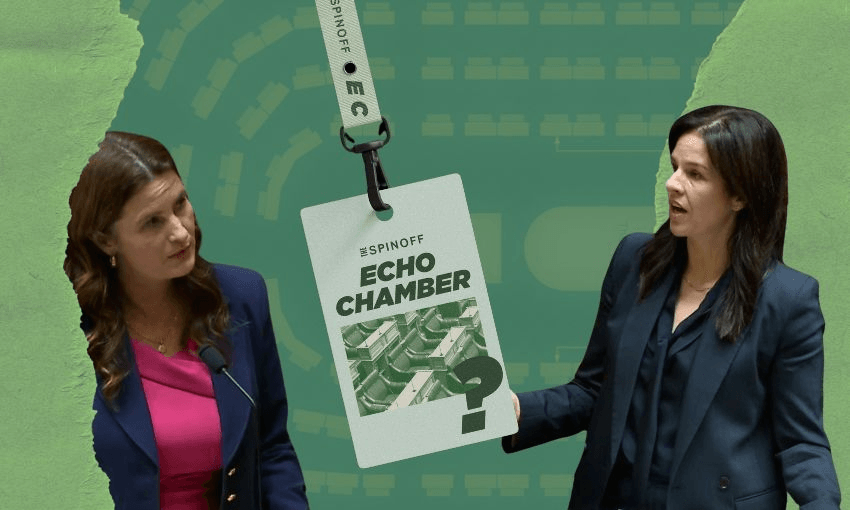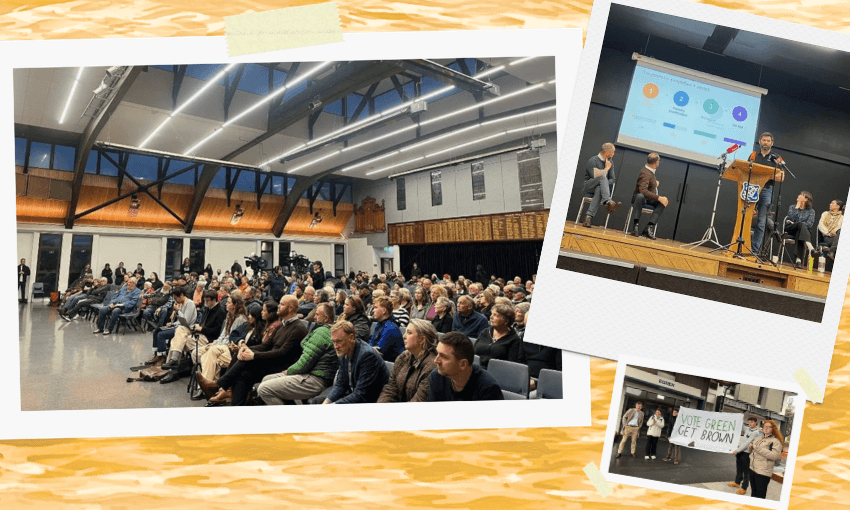Welcome back, parliamentary girlbosses. After three weeks away from the House, it didn’t take long to dirty up the clean slates. Xoxo, Gossip Girl.
Echo Chamber is The Spinoff’s dispatch from the press gallery, recapping sessions in the House. Columns are written by politics reporter Lyric Waiwiri-Smith and Wellington editor Joel MacManus.
It’s been three weeks since the cast of the 54th New Zealand parliament were last together in the House. In that time, the government agreed to scrap prisoner voting rights, Te Pāti Māori pledged to hold its own privileges committee, the Green Party teased a $8bn plan for “green jobs” and NZ First submitted a member’s bill which would define “woman” and “man” in law, among other things. They could’ve just enjoyed their holiday, but instead they’ve given us a lot to talk about – we’re quite lucky to have such hardworking MPs.
After all that, a few came back to the House a bit sleepy – like speaker Gerry Brownlee, who drew a few blanks just as Tuesday’s question time kicked off. As the parties paid tribute to the late Pope Francis, Brownlee confused Green MP Francisco Hernandez for “Franco” and simply stared at Act minister Nicole McKee until someone shouted her name.
But for the most part, everyone was switched on like a 16-year-old with a social media account. In particular, the fire in the bellies of the opposition benches had been freshly ignited by the news that the workplace relations minister, Act’s Brooke van Velden, had planned an overhaul of the pay equity process that would save the government “billions” in the upcoming budget. Also because librarians think they’re as hardworking as engineers, or something, which is obviously untrue as engineers don’t have the occupational hazard of fending off Destiny Church goons.
All the opposition party leaders wanted to know the same thing: whether the prime minister stood by all of his government’s actions and statements and what have you. Labour leader Chris Hipkins was first up, challenging Christopher Luxon on whether New Zealanders could trust the government to prioritise rights for women workers, but his wording in suggesting women were the “sacrificial lambs” for the budget had Act leader David Seymour giggling.
Well, that’s not quite what’s happening here, Luxon said, we’re just making sure the process is moving away from “market conditions” and focusing on “sex-based discrimination” – or, as van Velden told media earlier, stopping these low-wage workers from “gaming the system”. Hipkins must have missed the mob of female National ministers, among them Nicola Willis, Judith Collins, Erica Stanford, Louise Upston and Nicola Grigg, who had met reporters on their way to the debating chamber, or he would have realised this truly is a coalition for women.
Labour’s finance spokesperson, Barbara Edmonds, was still stuck on promises made in last year’s budget. Over parliament’s recess, finance minister Willis had confirmed only 1.2% of eligible families had received the FamilyBoost rebate, which she blamed on some bad number fudging by the Inland Revenue Department. As their back and forth kicked off, the barracking by Edmonds’ party colleagues almost overtook the whole show.
Essentially the entire Labour caucus wanted to know why hadn’t all families the government had promised would be eligible for this scheme accessed their rebate? Willis caved: “Well, it was very clear that it was up to 130,000 families.” In a way, setting a goal is kind of like setting a speed limit: just because 70km/h is the maximum speed, it doesn’t mean you have to drive it.
Fighting back against the barrage, Willis rose from her seat with the mana of a woman empowered by her workspace. She delivered her words with a robust and sustainable force, rising above her foes across the House with the message that “those who work hard should be rewarded for their effort, and the government should respect the wages of working people”.
It was a good time for the government side to cheer, but all you could hear was the sound of the Labour benches roaring. “After all of that, not one clap,” Labour’s Kieran McAnulty remarked. “There’ll be a right clap over there,” deputy prime minister Winston Peters warned. He seems like the kind of guy who might just do it, too.
Another empowered female MP, Collins, chose to look beyond the headaches the opposition was causing and celebrate the government’s successes. The defence minister – who has an obvious level of pride in her portfolio, and the work shows it – had announced a $2bn investment in maritime helicopters and an extra $957m for the defence force on Sunday, and had heard defence personnel were “absolutely fizzing” and “joined up to do stuff” because of it.
“I can hear you battling,” Te Pāti Māori co-leader Debbie Ngarewa Packer mocked. “And the ladies are paying for it,” Labour deputy leader Carmel Sepuloni cried out.
And to think, before all of this, the talk of the morning had been all about education minister Erica Stanford using her private Gmail account for ministerial business. But other than confirming to Labour MP Willow Jean Prime that she does indeed use the two-factor authentication for her Gmail account, questioning failed to break much ground – and the minister had her cabinet colleagues to back her up.
“People have got friends, just saying,” Collins called. Peters rose to his feet for a supplementary: “Does the minister find it unusual that there are some members of parliament who are so lacking in doing their duty as responsible MPs or ministers that nobody writes to them?”
It was one way to look at it. This just in, from Peters’ personal Gmail account: “Budget 2025 minutes: the potential economic impact of wokeism”, “meeting invite: dinner at Duke of Marlborough with business leaders”, “WINSTON MY KIDS ARE LEARNING ABOUT GAYS IN SCHOOL SEND HELP”, “Still thinking about a new ferry? You’ve left an item sitting in your cart”.





